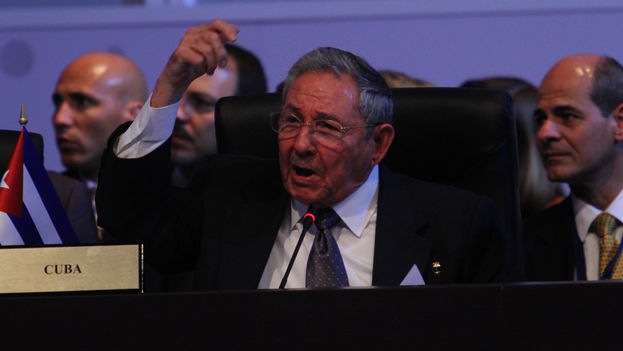
![]() 14ymedio, Reinaldo Escobar, Havana, 26 September 2015 — On Monday September 26, 1960 Fidel Castro gave a memorable speech at the United Nations General Assembly of nearly 5 hours. The anti-imperialist rhetoric of the bearded leader shocked representatives of Third World countries with lapidary phrases such as, “Let the philosophy of plunder disappear, and be gone the philosophy of war!” or that other one, “to his lordship the delegate of the United States, I take advantage of this opportunity to say that there are many mothers in the Cuban countryside and many mothers in Cuba, still waiting for their telegrams of condolence for their children murdered by American bombs.” In his defiant speech the commander mentioned the name of his neighbor to the north 148 times.
14ymedio, Reinaldo Escobar, Havana, 26 September 2015 — On Monday September 26, 1960 Fidel Castro gave a memorable speech at the United Nations General Assembly of nearly 5 hours. The anti-imperialist rhetoric of the bearded leader shocked representatives of Third World countries with lapidary phrases such as, “Let the philosophy of plunder disappear, and be gone the philosophy of war!” or that other one, “to his lordship the delegate of the United States, I take advantage of this opportunity to say that there are many mothers in the Cuban countryside and many mothers in Cuba, still waiting for their telegrams of condolence for their children murdered by American bombs.” In his defiant speech the commander mentioned the name of his neighbor to the north 148 times.
Fifty years and three days later, on another Monday, Raul Castro will rise to the green marble podium where his brother railed against president Eisenhower and the presidential candidates Nixon and Kennedy. But this 28 September the Cuban president’s tone will be less bellicose and, without a doubt, much briefer. The blockade, the Guantanamo naval base, compensation for the damages and injuries and an end to the broadcasts of Radio and TV Martí will be the high points of his agenda as conditions for the normalization of relations with the United States.
Most likely among all those present none are left of those who witnessed Fidel Castro’s marathon dissertation, nor have his promises survived
The Soviet Union no longer exists and Cuba is the only dictatorship in Latin America, where the last guerrilla has promised to lay down his arms. There are no colonies in Africa, and the greatest danger facing the developed countries of the western world is not communism, but Islamic fundamentalism. All the world’s leaders are closer than ever to reaching a global accord to save the planet from its environmental hazards. It is a different world today and Cuba cannot remain the same.
The meeting, which will last three days and includes the participation of 150 heads of state and government, has as its goal to discuss the new objectives of sustainable development; it opened with the speech of Pope Francis and in the course of it the proposals of Vladimir Putin and Barack Obama will be heard.
The presence of Raul Castro interrupts a 15-year absence of a Cuban leader in the General Assembly and will be the prelude to what will happen next month, when this forum of the United Nations again votes a resolution against the American embargo of the island. It has been speculated that the US delegation will abstain, which would be unprecedented in American foreign policy.
Most likely among all those present none are left of those who witnessed Fidel Castro’s marathon dissertation. Nor have the promises made that day, to make Cuba an island of hope, survived. The task of Raul Castro will be to erase the delirium and demonstrate sanity.
